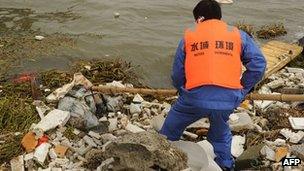China pulls nearly 6,000 dead pigs from Shanghai river
- Published
John Sudworth reports from Shanghai on the rising number of dead pigs
Officials say the number of pig carcasses found in Shanghai's Huangpu River has risen to nearly 6,000.
In a statement, Shanghai authorities said that 5,916 dead pigs had been removed from the river by Tuesday.
But they said water from the river was safe, with water quality meeting government-set standards.
It is believed that the pigs may have come from Jiaxing in the neighbouring Zhejiang province, although the cause of their deaths is still not clear.
In a statement, the Shanghai municipal government said that the water in Huangpu River, which is a major source of drinking water for Shanghai, was safe. It also said that no diseased pork had been detected in markets.
However, the news has been met with scepticism by some users on weibo, China's Twitter equivalent, where the hashtag "Huangpu River dead pigs" has emerged.
"Cadres and officials, we are willing to provide for you, but please don't let us die from poisoning. Otherwise who will serve you? Please think twice," said netizen Shi Liqin.
"This river's colour is about the same as excrement, even if there weren't dead pigs you couldn't drink it," said another, with the username Yuzhou Duelist.
The general mood is of concern, rather than outrage or panic, reports the BBC's John Sudworth in Shanghai, as the Chinese public are well used to food scandals, such as the use of oil scraped from sewers for cooking, and plasticiser found in baby formula.
'Timely data'
The government statement said that the number of pigs being salvaged from the river appeared to be decreasing.
Laboratory tests have identified that some of the pigs had porcine circovirus, a common disease that affects pigs but does not affect humans.
Reports suggest the dead pigs may have been dumped from pig farms in Jiaxing, upstream of Shanghai.

The scandal comes amid growing concerns about China's environment
"We don't exclude the possibility that the dead pigs found in Shanghai were from Jiaxing. But we are not absolutely sure," Jiaxing local government spokesman Wang Dengfeng told a news conference.
Whilst tags on the pigs' ears indicated that they were from Jiaxing, this only showed the pigs' place of birth.
"It is unclear where the dead pigs were raised," he said.
Jiaxing officials have also said that the pigs may have been killed by cold weather.
In an opinion piece, external, the state-run Global Times said that the pig scandal comes amid growing concerns about China's environment, including recent record smog levels in Beijing, and water and air pollution affecting villages.
"The country's citizens, including both ordinary people and officials, should bear in mind the necessity of protecting the environment," it said.
It called on officials to publish "timely data regarding the quality of drinking water to reassure the public".
- Published11 March 2013